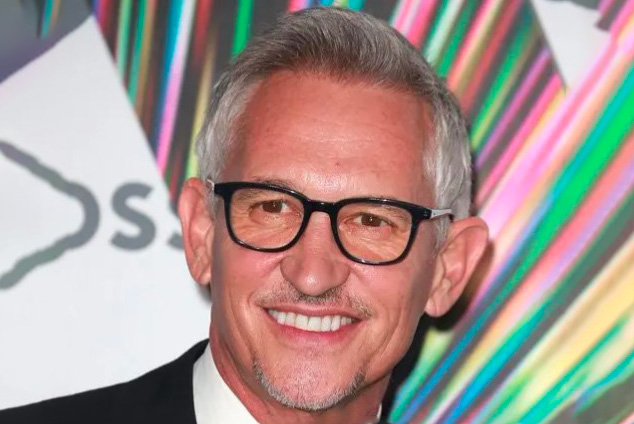There is nothing that has the sandlewood-tinged fragrance of privilege more than multimillionaire broadcaster Gary Lineker being hailed as the voice of the downtrodden.
Actually there is: the sight of fellow multi-millionaire ex-footballers (most of whom, like Lineker, get handsomely paid by commercial broadcasters alongside freelance BBC work) going on strike to support Saint Gary after he was stripped of his duties presenting Match of the Day. Instead of the usual 70-minute football highlights show, last Saturday’s programme was a chilling husk of a show with no opening titles, no summarisers and no pundits to contextualise or analyse any of the footage.
Lineker has lost nothing over the past week. BBC director-general Tim Davie has publicly declared Lineker is the “best in the business” and clearly doesn’t want to lose him. The presenter, who freelances for the BBC, has already made millions elsewhere, most notably as frontman for BT Sport’s Champions League coverage for many years as well as jobbing for NBC and Al Jazeera.
Meanwhile, his clumsy Tweet about Nazi propaganda will very likely do nothing to further the cause he clearly cares about. All communication is framed by the person communicating — all people will remember is that ‘Lineker called the Government’s Nazis’, very few will remember why. For the Government and this demonic Home Secretary Suella Braverman, Lineker has simply given them what they wanted all along: a leftie BBC Remainer having a go at the Government for wanting tough border controls.
As our weekly chief media commentator Raymond Snoddy tells me, Lineker did technically breach impartiality standards but points out the risk is lower when “a sports or science presenter [is] expressing views on politics or the arts.”
For Snoddy, it is Davie who should now consider his position because of the “inconsistent application of impartiality standards”. Meanwhile, “Lineker is clearly winning the popularity vote”, which doesn’t help.
I happen to think what Lineker said is correct and not particularly controversial. But that’s not important and I won’t dwell on why. You don’t come here for politics and, frankly, there is far too much political content in the internet media age in which dividing us and enraging us has proven a pretty effective method of “engaging users” in that horrible parlance of the attention economy.
Meanwhile, fellow columnist and media agency founder Nick Manning reckons that the furore may cause some good, as it has “exposed the fault lines in the current management of the BBC at a crucial time while highlighting the Government’s unworkable ’small boats’ policy.”
Perhaps. But what has been telling over the last week is how the coverage of Lineker’s tweet, and the prospect that a presenter may lose his extremely well-paid job as a football broadcaster, is a much bigger story than the thing that prompted his tweet — an immigration bill so heinous that it’s been condemned by the United Nations for contravening our human rights laws.
You’ve likely already read or heard elsewhere that Lineker has been singled out for speaking his mind, whereas people like Jeremy Clarkson, Alan Sugar or Andrew Neil faced no such sanction during their very high-profile careers as household names thanks to their BBC programmes.
“Lineker casting himself as the voice of the downtrodden is a tad messianic, but if the likes of Sugar and Neil can opine from their side of the political spectrum why not him?” asks Stephen Arnell, another columnist and broadcasting consultant.
Not even W1A would write this stuff
All of which brings us back to Davie, who made “impartiality” his big thing when taking the DG reins in 2020.
Of course the whole ideal of any human being, let alone any media professional, being completely impartial is a fantasy. The BBC’s own guidelines make clear that it is not impartial about racism. Okay, fine. But then we hear mixed messages about whether its staff can support anti-racism campaigns. Davie has faced pressure over pulling out of a Stonewall diversity scheme over its stance on gender issues.
I have sympathy for Davie, who is facing an onslaught of pressure from the Government, which after 13 years has pushed the BBC to the limit with successive funding cuts. Not only are the usual Right-wing newsbrands as hostile as ever in their anti-BBC agenda, but we now have added support from TV fringe channels TalkTV and GB News talking about the bogeyman most nights, too.
And yet I have to agree with Emily Bell, the former Guardian News and Media director of digital content and Columbia University professor, who said appointing Davie was a mistake because he lacked “editorial authority”.
It doesn’t exude editorial authority when you decide to suspend one of your most high-profile stars over something which, we are told, isn’t even part of his longstanding contract with the BBC, hence talk of Lineker coming back once a policy over his tweets has been “agreed”.
It just so happens that Davie is a former Conservative Party politician, while chairman Richard Sharp just happens to have donated more money to the Conservatives than I have earned during my entire career (not to mention recent revelations about being a prospective money man for Boris Johnson).
Really? Not even the writers of W1A would have thought so lowly of the BBC by writing that storyline.
The BBC’s handling of this episode has been nothing short of catastrophic. Davie, as head of the Corporation and the executive responsible for this mess, will always be remembered and likely never forgiven for it. He does not have a journalistic or broadcasting track record that gives colleagues reason to give him the benefit of the doubt when things go wrong. He is a former PepsiCo marketer who was brought in to give the BBC more of a commercial-looking image, before evidently wowing the Board of Government with his Tory credentials (the DG is, after all, the BBC’s lobbyist-in-chief, among other things).
The BBC does have important questions to answer generally about how feasible it is to commit to “due impartiality” when media personalities are encouraged to be active on social media and give their opinions about all manner of things. Whether Davie is the person to lead them through this minefield seems more doubtful with each passing day.
So, as bizarre as it may seem, this pointless stunt by Lineker may be the clarifying moment the BBC needs when it comes to a well-thought out policy over impartiality and its management structure.
 Omar Oakes is editor of The Media Leader. 100% Media 0% Nonsense is a weekly column about the state of media and advertising. Make sure you sign up to our our daily newsletter to get this column in your inbox every Monday.
Omar Oakes is editor of The Media Leader. 100% Media 0% Nonsense is a weekly column about the state of media and advertising. Make sure you sign up to our our daily newsletter to get this column in your inbox every Monday.





 Omar Oakes is editor of The Media Leader.
Omar Oakes is editor of The Media Leader.